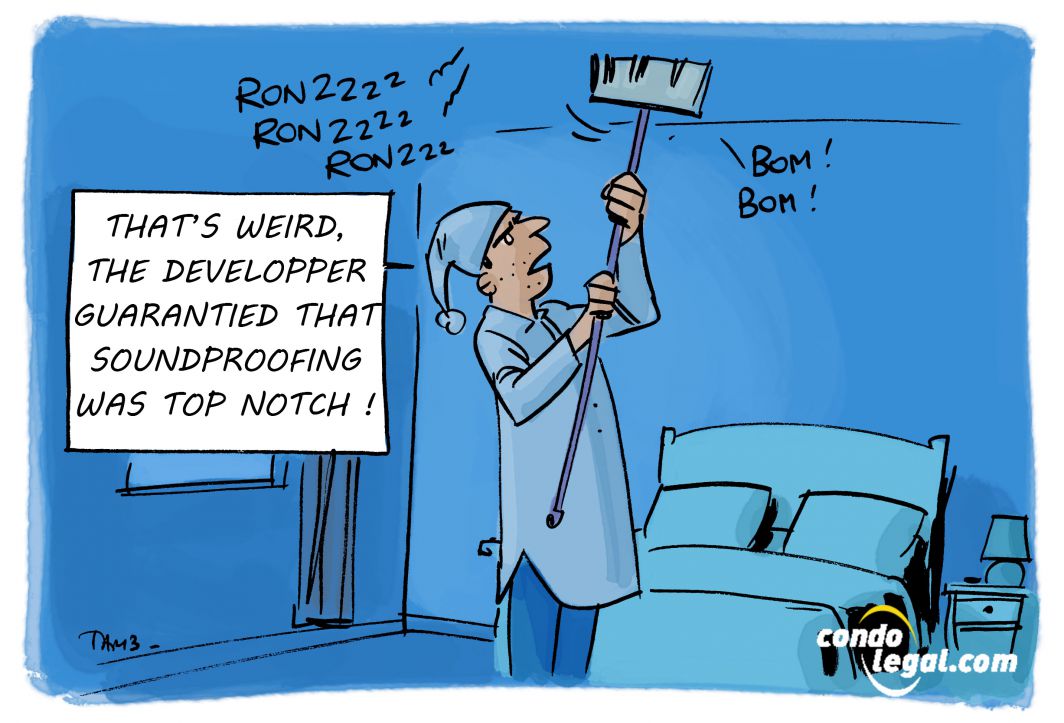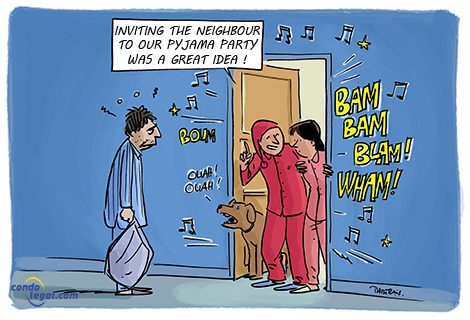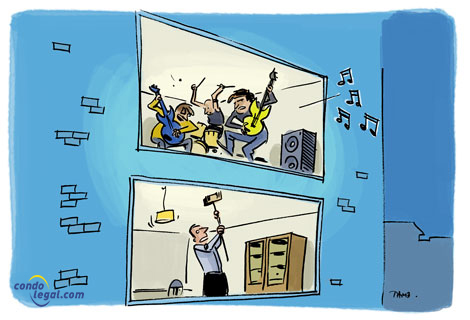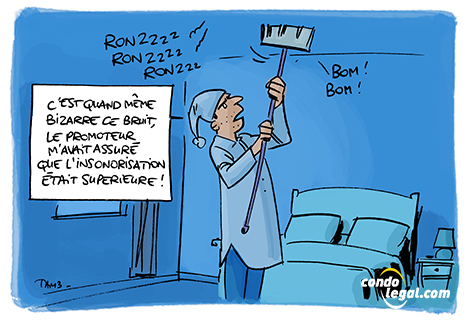Soundproofing

Acoustic comfort is an important element for the quality of life of the occupants of an apartment building. However, it is recognized that noise is one of the most common nuisances in co-ownership. Many disputes between co-owners arise from the noise generated by each other. This bone of contention generates several disputes. To be honest, the proper sound insulation of apartments is one of the main components to watch out for while shopping for a condo. It should be remembered, however, that "acoustic comfort" is not synonymous with sound transmission index (ITS).
This index measures the soundproofing capacity (e.g. of a wall), i.e. the average transmission loss of airborne noise through an assembly, expressed in decibels (db). The higher the ITS index, the better the sound insulation.
Scenario
The apartment concerned may be in a building whose construction is planned, newly built or existing for several years. And beware: a simple visit of the premises does not always allow to appreciate, in whole or in part, the noise nuisance resulting from poor soundproofing. The specific sources to these nuisances are multiple and complex. Quite simply, appropriate soundproofing should be on top of your shopping list.
Newly built or future co-ownership
If it is a new divided co-ownership, a developer, who calls himself a professional, will not hesitate to stipulate the criteria they intend to meet in terms of soundproofing. However, most developers fail to mention it in their documentation. Therefore, it is required to address the following questions:
- Does the construction of the building have a sound insulation quote?
- Does this specification include sufficient sound insulation standards to limit the propagation of noise (airborne/vibration) in the dwellings?
- If so, what are they?
- Is it possible to obtain and consult the acoustical specifications of the building? And if not, why not?
- Has an independent professional tested and approved the soundproofing of the premises?
- If so, is there a way to obtain a copy of the conclusions made by that professional?
- Are these rules in the declaration of co-ownership related to the acoustical performance of the building?
If there is no specification for acoustic standards to be met in the memorandum, the declaration of co-ownership or in the developer's construction estimate, it is suspicious. You will then have to rely only on the good faith of the promoter, which is obviously not recommended.
Existing co-ownership
The declaration of co-ownership generally includes provisions to regulate or even prohibit certain activities or behaviours within a co-ownership, in order to avoid the birth of abnormal neighbourhood disturbances. For example, an abnormal neighbourhood disturbance may result from noise pollution, such as the unauthorized replacement of a carpet with a hardwood floor. In this regard, it is generally mentioned in the declarations of co-ownership that no modification can be made by a co-owner to a private portion that would have the effect of reducing the quality of the soundproofing.
You should therefore make several visits to the places where you want to move. Go back a few times and at different times of the day. During your observations and analyses, you should get answers to the following questions:
- Are there rules in the declaration of co-ownership related to the acoustical performance of the building?
- If this is the case, how are those rules drafted?
- Are those rules sufficient to insure the adequate acoustical performance, not only for airbone noises, but also for impact noises?
- Has there been modifications by the co-owners to their apartments?
- If so, have these changes led to a decrease in the acoustic performance of the building?
- Are there conflicts caused by noise between the co-owners and the syndicate (or between the co-owners)?
Acoustic comfort
Whether the purchase is made in the new or in the existing, no unbearable noise should, by its duration, repetition or intensity, affect the tranquility of a new occupant. This rule applies to an entire person, whether he or she is the originator or through a person, a thing in his or her custody or an animal under his or her responsibility. In the same way as a construction defect, a source of excessive noise, when known to the seller, must be brought to the attention of the buyer before the conclusion of the sale of a property, under penalty of seeing the case brought before the courts.
 WHAT YOU SHOULD KNOW! Before replacing your old carpet with a new floor covering (e.g. hardwood, engineered wood, vinyl and ceramics) you must ensure that this does not create any acoustic disturbance that generates an abnormal disturbance of the neighborhood.
WHAT YOU SHOULD KNOW! Before replacing your old carpet with a new floor covering (e.g. hardwood, engineered wood, vinyl and ceramics) you must ensure that this does not create any acoustic disturbance that generates an abnormal disturbance of the neighborhood.
 WHAT TO KEEP IN MIND: It is useful to read the declaration of co-ownership, which can limit or prohibit certain types of noises. Remember that exposure to noise can seriously harm health. Noise is usually a stressor that can have negative consequences on sleep quality. It is also associated with irritability, anxiety, and even aggression.
WHAT TO KEEP IN MIND: It is useful to read the declaration of co-ownership, which can limit or prohibit certain types of noises. Remember that exposure to noise can seriously harm health. Noise is usually a stressor that can have negative consequences on sleep quality. It is also associated with irritability, anxiety, and even aggression.
 WARNING! The definition of "superior" soundproofing used by a manufacturer is difficult to quantify legally speaking. Even more so if co-owners are disappointed with the level of soundproofing promised, and they resort to the court to assert their rights. In this sense, acoustic comfort is a fuzzy concept that is only clarified when one is dissatisfied with it.
WARNING! The definition of "superior" soundproofing used by a manufacturer is difficult to quantify legally speaking. Even more so if co-owners are disappointed with the level of soundproofing promised, and they resort to the court to assert their rights. In this sense, acoustic comfort is a fuzzy concept that is only clarified when one is dissatisfied with it.
Return to the super file Condominium Shopping Guide
.png)




